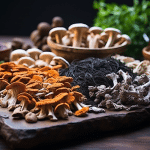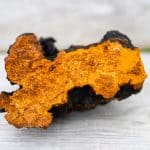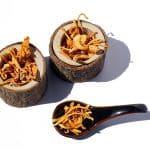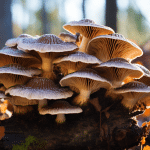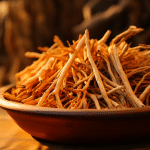Lion’s mane mushrooms have amazing benefits for brain growth, and seem to ease symptoms of ADHD. But could it actually be as effective as Adderall? Let us look at it more closely.
What is Lion’s Mane?
Lion’s mane (Hericium erinaceus) is a shaggy-looking mushroom found throughout Europe, Asia, and North America. It is known to be one of the healthiest mushrooms that you can eat thanks to its numerous benefits, so it is not surprising that lion’s mane has been a staple of alternative medicine for centuries.
Research into the potential benefits of the lion’s mane mushroom indicates that the mushroom has the potential to aid nerve regeneration by producing neural growth factor proteins, thus healing brain cells. It appears to alleviate symptoms of dementia, reduce oxidative stress, as well as enhance cognitive functions and neuronal health.
What is ADHD?
ADHD (attention deficit hyperactivity disorder) is a medical condition affecting focus and self-control. These days, the condition is typically diagnosed during childhood, though many people who were raised decades ago learned of the condition in adulthood. The causes of ADHD are not known, but genetic and environmental factors are known contributing factors. In addition, alcohol and tobacco consumption in pregnancy may affect susceptibility to ADHD. There might be differences in brain chemistry between those who have ADHD compared with those without the disorder.
Typical ADHD Treatment Options
Traditional treatment for ADHD typically involves medications and psychotherapy. The most common drug is an amphetamine called Adderall. When it comes to psychotherapy, cognitive-behavioral therapy (CBT) is the most common modality used for treating this condition.
Can Supplements Interfere with Adderall?
Supplements containing Vitamin C (ascorbic acid) may interfere with Adderall. Vitamin C is an acid, whereas Adderall’s active ingredients are alkaline, and they do not interact well with acids. So, Vitamin C may inhibit Adderall absorption. Since ascorbic acid may be present in many foods, you should err on the side of caution and take your Adderall about one hour before you eat breakfast.
Natural Alternatives to Adderall
Nootropics, also known as smart drugs, are the most commonly used natural alternatives to Adderall. These brain-boosting supplements typically contain B vitamins (especially Vitamins B6 and B12), ginkgo biloba, citicoline, alpha-GPC, and other adaptogenic compounds, which enhance brain function.
Herbal supplements (such as Rhodiola Rosea and Marine Pine Bark Extract) may also work as a brain booster, though research about their interactions with Adderall is lacking.
More people with ADHD are now turning to mushrooms for ADHD management and treatment, with the functional mushroom, Lion’s Mane mushroom showing the most promise due to their brain-boosting properties.
Does Lion’s Mane Mushroom Help with ADHD?
Although no studies have been conducted regarding the effects of lion’s mane extract for ADHD, anecdotal evidence suggests it may prove to be quite helpful if used alongside conventional treatments.
Many individuals with ADHD have used this medicinal mushroom as a natural treatment because of its ability to enhance attention span and ease symptoms of mental health disorders, which are common in ADHD. Lion’s mane shows a lot of potential when it comes to improving concentration and improving cognitive functions.
It has been shown to enhance cognitive function, with the effects on attention and memory being especially helpful. It is also shown to ease symptoms of anxiety and depression. In short, lion’s mane mushroom helps many symptoms of ADHD, although there is not enough research about its effects on ADHD specifically. Although since lion’s mane has no serious side effects, we do recommend trying it to see how it affects you personally and if you experience any benefit.
Lion’s Mane vs. Adderall: Which is Better for ADHD?
Lion’s mane mushroom and Adderall are not the same in the way they stimulate and interact with your brain. Adderall stimulates the central nervous system (much like coffee does), which increases brain activity in those with ADHD. Unfortunately, Adderall comes with side effects, like headaches, nervousness, insomnia, appetite loss, and more.
If you’re looking for immediate relief, and are willing to put up with the potential side effects, adderall is the best choice.
If you want to avoid the serious side effects and try an all natural approach, lion’s mane is better. I’ve personally enjoyed the improve focus and concentration from taking lion’s mane, and I’ve taken a fairly low dose. You can safely take 2-3 grams of lion’s mane daily, which should give you an idea of whether or not it is effective for you.
Many individuals with ADHD do not like to use Adderall because of the seriousness of its side effects, or they might hesitate to try the drug. Lion’s mane mushrooms may also work as an alternative to adderall, with a far less dramatic impact on the body since there are no major side effects associated with lion’s mane.
Nowadays, many ADHD patients choose to use natural supplements and avoid Adderall entirely, while others pair medication with a nootropic like lion’s mane. If you are looking to discontinue your use of Adderall, be sure to talk with your doctor or health care provider before making any changes.
How Much Lion’s Mane Mushroom Should You Take for ADHD?
Anecdotal evidence suggests you need to take high doses of lion’s mane for it to ease symptoms of your ADHD. Lions mane dosages for ADHD typically range between 2000mg to 5,000mg a day, but it is best to start at 2000mg and increase over time.
If you are a beginner with this brain-boosting nootropic, starting at 2000 mg could lead to digestive issues, although that’s very rare. To avoid this side effect, take lion’s mane with your meals.
You can find our favorite capsules, powders, and tincture’s on the following pages of our website and learn more about each individually:
Click here for Our Favorite Lion’s Mane Supplements
Click here for Our Favorite Lion’s Mane Powders
Click here for Our Favorite Lion’s Mane Tinctures
Click here for Our Favorite Lion’s Mane Gummies
Additional Resources:
Is Lion’s Mane Mushroom Good for Sleep?
Should I take Lion’s Mane With or Without Food?
Updated 10/12/2022









